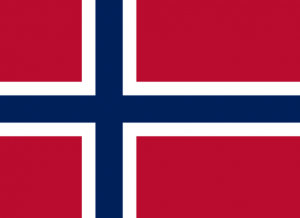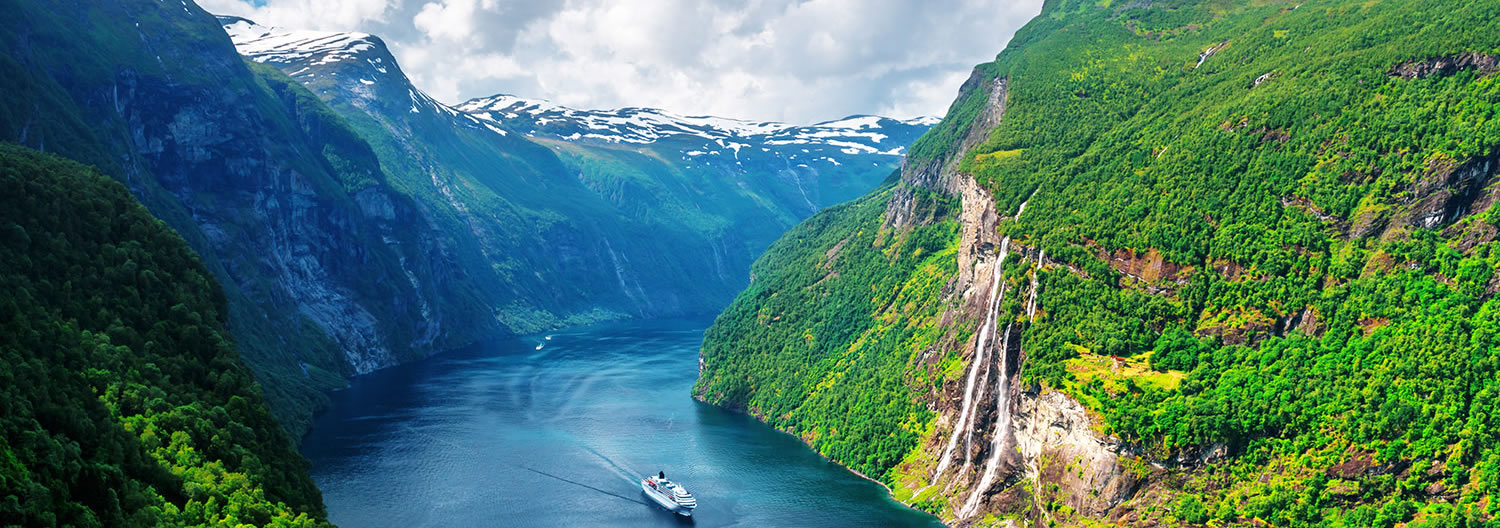Language/Norwegian-bokmal/Culture/Norway-Timeline
< Language | Norwegian-bokmal | Culture
Jump to navigation
Jump to search
Rate this lesson:
Historical Timeline for Norway - A chronology of key events
Norway Timeline[edit | edit source]
| Date | Event |
|---|---|
| 789 | Attack on Portland, England, by three Viking ships. |
| 845 | First looting of Paris by the Vikings. |
| 870-930 | Colonization of Iceland. |
| 872 | Naval battle of Hafrsfjord and beginning of the unification of Norway by Harald I with the beautiful hair. |
| 911 | King Charles the Simple cedes the territories of the lower Seine to the Viking leader Rollo, who founded the Duchy of Normandy. |
| 982 | Beginning of the colonization of Greenland by Erik the Red. |
| 995 | Unification of Norway by Olav I Tryggvasson. |
| 1000 | Expedition and discovery of North America by Leif Eriksson, whom he calls "Vinland". |
| 1030 | Death of Olav I Haraldsson (Olav the Saint) at the battle of Stiklestad, date which marks the introduction of Christianity. |
| 1066 | Attempt to conquer England by King Harald III the Severus of Norway; battle of Stamford Bridge, where he is killed. |
| 1066-1093 | Reign of Olav Kyrre. |
| 1100-1110 | Foundation of the first monasteries in Norway: Selje, Nidarholm and Moster. |
| 1163 | Coronation of Magnus V Erlingsson, who receives spiritual authority from the Church. |
| 1179 | Birth of Snorri Sturluson, Icelandic skald (poet). |
| 1217-1263 | Reign of Håkon Håkonsson who, from Bergen, the capital, extends his authority over Iceland and Greenland as well as the Faroe Islands, Orkney and Shetland. |
| 13th century | Norway becomes a protectorate of the league of German traders, the Hansa. |
| 1263-1280 | The height of Norwegian greatness under the reign of Magnus VI the Legislator. |
| 1319-1343 | Magnus VII Eriksson momentarily reunites Norway and Sweden. |
| 1343-1380 | Reign of Haakon VI Magnusson. He marries Marguerite, daughter of the King of Denmark. |
| 1349 | The Black Death decimates the country, which strengthens the Danish hold on Norway. |
| 1380-1387 | Treaty between Norway and Denmark under the Danish regent Marguerite. |
| 1397-1523 | Kalmar Union between the three Scandinavian countries: Sweden, Norway and Denmark. |
| 1523 | Independence of Sweden. Norway becomes a simple dependency of Denmark, which suppresses its Council of State, imposes on it Lutheranism and the Danish language. |
| 1645 | Loss of the Norwegian provinces of Jämtland and Härjedalen to Sweden. |
| 1648-1670 | Reign of Frederick III, Danish king favorable to Norway. |
| 18th century | Economic boom (wood, shipyards, metals, fishing). |
| 1814 | Treaty of Kiel. Denmark cedes Norway to Sweden. By the National Assembly of Eidsvoll, on May 17, Norway obtains its own constitution, but remains dependent on the King of Sweden. |
| 1898 | Introduction of universal male suffrage. |
| 1905 | Independence of Norway. Prince Charles, son of Frederick VIII of Denmark, becomes King of Norway under the name of Haakon VII. |
| 1913 | Women's right to vote. |
| 1935-1965 | Labor is in power. |
| 1940-1945 | German occupation. |
| 1949 | Norway joins NATO. |
| 1952 | Creation of the Nordic Council uniting Norway, Denmark and Sweden, joined in 1956 by Finland. Abolition of the passport requirement between these countries. |
| 1957 | Death of King Haakon VII, accession of Olav V. |
| 1959 | Norway enters EFTA (European Free Trade Association). De Gaulle's veto blocks Norway's candidacy for the EEC (European Economic Community) at the same time as that of England. |
| 1969 | Discovery of the first oil field in Norwegian territorial waters by the American company Philips. |
| 1972 | Referendum on the application for membership of the EEC which results in a no (54% against 46%). |
| 1975 | Creation of a Nordic investment bank (NIB) simplifying economic exchanges between Norway, Denmark, Sweden and Finland. |
| 1988 | After the oil shock, Norwegian imports are reduced by 12%. Norway begins to create its own oil companies. |
| 1990 | Gro Harlem Brundtland, a woman, becomes Labor Prime Minister for the third time, after the interlude of a right-wing coalition government. |
| 1991 | Death of King Olav V and coronation of Harald V in Trondheim Cathedral. Thanks to the EEA (European Economic Area) treaty, concluded between the EU (European Union) and EFTA, Norway remains in the European fold. |
| 1994 | New referendum on Norway's accession to the EU. Once again, the "no" wins (52.2% against 47.8%). Norway's accession to the Schengen agreements (unlike Great Britain, although it is part of the EU). Thanks to oil, the Norwegian budget is largely in surplus |
| 1996 | The tremendous economic boom allows the creation of an "oil fund", to ensure the "after-oil". Norway signs the Amsterdam Treaty, which guarantees the free movement of people and the rights of European citizens to work in Norway without a work permit. Inau |
| 2000 | In March, Kjell Magne Boudevick, Prime Minister, resigns. A Labor government is formed. |
| 2001 | September, the Labor Party loses the general elections. Kjell Magne Boudevick returns to power. |
| January 21, 2004 | Birth of Ingrid Alexandra, Princess of Norway. |
| March 3, 2005 | Centenary of Norwegian independence. |
| September 12, 2005 | the left wins the legislative elections. Jens Stoltenberg becomes Prime Minister. |
| September 29, 2006 | Cabinet reshuffle, but Jens Stoltenberg remains Prime Minister. |
| November 25, 2008 | Opposition to entry into the European Union reaches a new record in the country, according to a study carried out by the Sentio agency. 53.4% of those questioned say they are hostile to joining the EU, while only 34.6% are in favor. |
| February 3, 2009 | The government unveils its stimulus plan to counter the financial crisis, the most important in the past thirty years. It amounts to 20 billion Norwegian kroner, or 2.25 billion euros. |
| September 14, 2009 | Last legislative elections seeing the victory of the Labor Party. |
| December 14, 2010 | The Nobel Peace Prize is awarded in Oslo to an empty chair. Chinese dissident Liu Xiaboo wins the award. |
| February 14, 2011 | Already tightened in 2009, the conditions for obtaining Norwegian nationality for immigrants now provide for a compulsory Norwegian language test. |
| February 24, 2011 | The Nordic Skiing World Championships kick off in Oslo. |
| July 22, 2011 | Norway is experiencing its worst act of violence since World War II. An attack on the Prime Minister's seat, followed by a shooting on the island of Utoya, where the Labor youth were gathered, will result in the deaths of 77 people. The perpetrator of the |
| September 9, 2013 | Victory for the Conservative Party and the Populist Right Party coalition in the legislative elections. Erna Solberg is Prime Minister. |
| May 6, 2014 | Celebration of the Bicentenary of the Norwegian Constitution. |
| May 2014 | Norway reaffirms its opposition to joining the EU. The "no" wins at 70%. |
| September 14, 2015 | Victories for the Labor Party in the local elections, after 18 years in opposition. We will also note the breakthrough of the Greens in the political landscape. During these elections, the government announces that the country will have to face the fall i |
| Summer 2015 | Norway sees a significant increase in the arrival of migrants (there are 31,000 new asylum requests). Russia will later help Norway stop these flows. |
| November 16, 2015 | The government announces a tightening of the migration policy and tighter border controls. |
| December 16, 2015 | A new Immigration Department is created, aiming for a stricter policy with regard to immigration. |
| In 2015 | The official development assistance budget is 34.5 billion euros. Brazil, Afghanistan, Syria and Malawi are the main stakeholders. Norway is thus fighting against deforestation in Brazil and supporting emergency aid in Syria. |
| February 4, 2016 | Norway is organizing, with the United Kingdom, Germany, Kuwait and the United Nations, the London Conference to help the arrival of refugees in their host countries, neighbors of Syria. Norway promises to pay nearly 1 billion euros in aid following the Sy |
| In 2016 | The Lutheran Church in Norway allows religious marriage to same-sex couples. |
| September 2017 | Erna Solberg, from the Conservative Party, is reappointed as Prime Minister. |
| January 2018 | The NGOs Greenpeace and Nature Og Ungdom lose their case against the Norwegian state. Environmental organizations had lodged a complaint against the Ministry of Petroleum, contesting oil exploitation in the Arctic. |
Source[edit | edit source]
World Timelines[edit source]
Other Lessons[edit | edit source]


